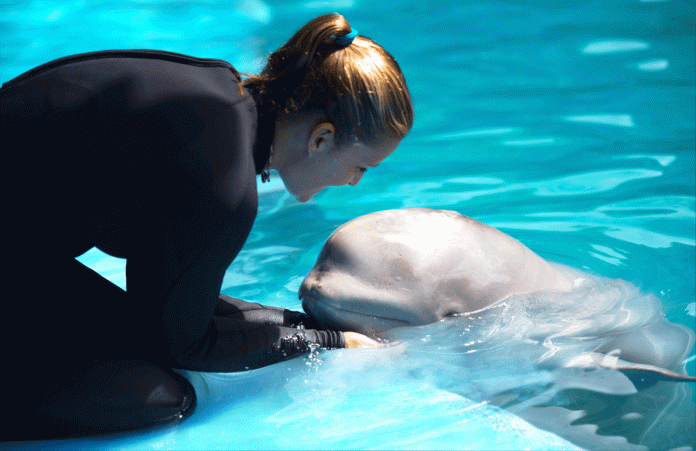
Just a year after he was founded stranded and severely underweight on a mudflat in Cook Inlet, Tyonek is still taking his daily feedings by bottle, but also developing a taste for fish like herring and capelin.
The one-month old beluga whale calf is now at home at SeaWorld San Antonio.
Since April, he has been introduced to new environments outside of the support pool where he received around-the-clock care, then one-by-one introductions to all nine members of SeaWorld’s beluga whale pod.
He has grown from just five feet three inches long and 140 pounds to six feet 10 inches and 400 pounds. His growth is right on track, say the animal care experts and veterinarians caring for him at SeaWorld.
Tyonek’s first family was an endangered population of Cook Inlet beluga whales. He is the first of his species to be successfully rescued and rehabilitated.
“Tyonek’s successful rehabilitation and growth is the result of an amazing team effort involving federal authorities, numerous organizations, and rescue and recovery experts in multiple states,” said SeaWorld Chief Zoological Officer Chris Dold. “Experts from several organizations collaborated to give Tyonek a second chance at life, and his growth, acceptance from the beluga pod and recent milestones are a testament to this team-curated care from many passionate and dedicated professionals.”
Experts from the Alaska SeaLife Center in Seward believe that when discovered, Tyonek was had been stranded for several hours. From October 2017 until January 2018, experts from SeaWorld, Georgia Aquarium, Shedd Aquarium, Mystic Aquarium and Vancouver Aquarium supported the SeaLife Center and NOAA Fisheries in providing the young beluga with around-the-clock care.
In January NOAA Fisheries determined that Tyonek was non-releasable because he remained nutritionally and socially dependent due to his young age at the time of stranding, and that he lacked survival and socialization skills to be on his own in the wild.
SeaWorld San Antonio was chosen by NOAA Fisheries as the calf’s new home, because that location could accommodate his social and medical needs, support necessary transport and contribute to scientific research on the species to help conservation efforts in the wild.
SeaWorld already had a population of nine beluga whales, including both adult females and young male beluga calves that proved important for Tyonek’s social development.
“Belugas are social creatures that need to be integrated into multi-generational groups to properly develop and thrive,” said Heather Hill, professor at St. Mary’s University in San Antonio. “The males in the SeaWorld San Antonio pod are close to Tyonek’s age, which further helped with his socialization and his overall recovery and growth.”
Dr. Steve Osborn, senior veterinarian at SeaWorld, notes that Tyonek is mimicking other whales’ behaviors and playing with toys.
“He is also swimming and playing, sitting face-to-face, bumping and pushing up against other belugas, all positive signs as he continues to grow and learn,” Osborn said.
SeaWorld is dedicated to beluga whale research, education and conservation. The organization has played an important role in assisting research in more than 20 published scientific studies about beluga whales since opening in 1988.
“The placement of Tyonek at SeaWorld San Antonio – and the scientific knowledge gained by learning from him or years to come – will benefit Cook Inlet beluga research and recovery,” NOAA Fisheries said.
Learn more about SeaWorld San Antonio at https://seaworld.com/san-antonio/

Photo courtesy of SeaWorld San Antonio














